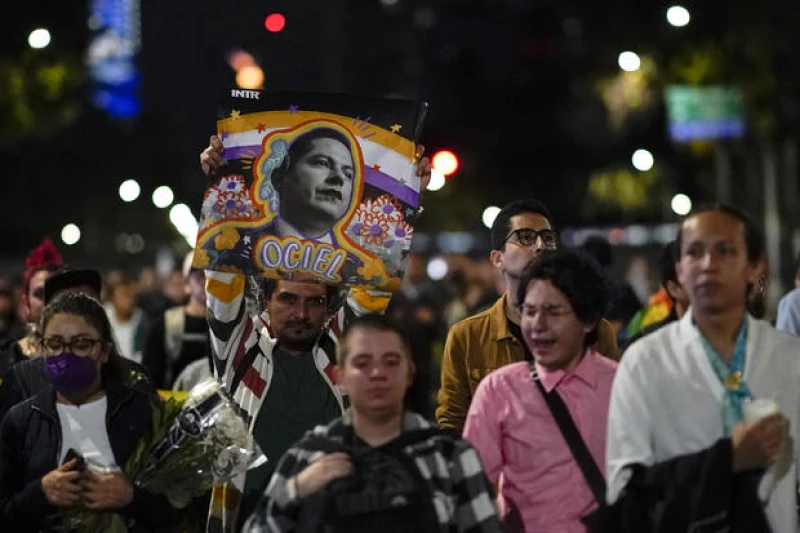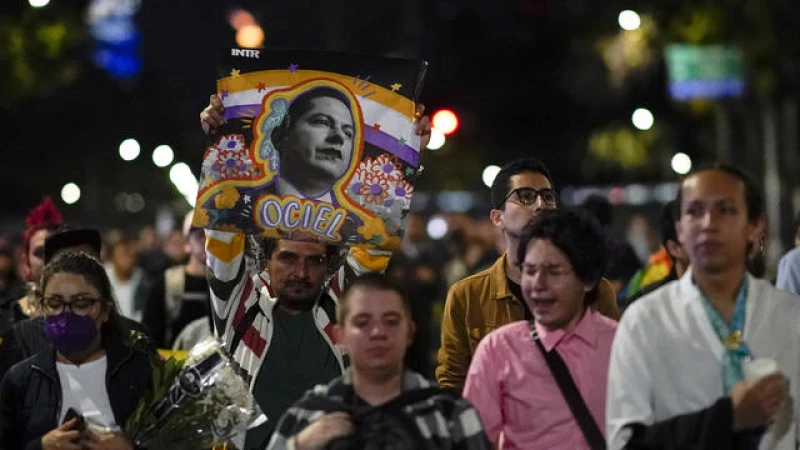Mexico City Marches for LGBTQ+ Figure Jesús Ociel Baena
Thousands marched in Mexico's capital Monday night demanding justice for Jesús Ociel Baena, an influential LGBTQ+ figure who was found dead at home in the central city of Aguascalientes after receiving death threats. Baena was the first openly nonbinary person to assume a judicial post in Mexico, becoming a magistrate in the Aguascalientes state electoral court, and broke through other barriers in a country where LGBTQ+ people are often targeted with violence.

The state prosecutor's office confirmed that Baena was found dead Monday morning next to another person, who local media and LGBTQ+ rights groups identified as Baena's partner, Dorian Herrera.
State prosecutor Jesús Figueroa Ortega said at a news conference that the two displayed injuries apparently caused by a knife or some other sharp object.
"There are no signs or indications to be able to determine that a third person other than the dead was at the site of the crime," Figuerora Ortega said.
The deaths of LGBTQ+ magistrate, Baena, have caused outrage among LGBTQ+ groups who believe authorities are trying to dismiss violence against their communities. Baena was known to be optimistic and enthusiastic about the future in recent weeks.
During a briefing, Federal Security Secretary Rosa Icela Rodríguez stated that the deaths are currently under investigation and it is unclear whether they were homicides or accidents. In Mexico, some homicides are quickly downplayed as crimes of passion.
A presence on social media
Alejandro Brito, director of LGBTQ+ rights group Letra S, emphasized the visibility of Baena on social media and urged authorities to take this into account during the investigation. Brito stated, "Baena received numerous hate messages and even threats of violence and death. These cannot be ignored in the investigation. Baena was breaking through the barriers that oppressed the nonbinary community."
Thousands of people gathered in Mexico City to honor Baena and other victims of anti-LGBTQ+ violence. They demanded justice and a thorough investigation into the deaths.
Nish López, who came out as nonbinary in March, was among those who were inspired by Baena.
"I loved them because they made people uncomfortable, but they knew what they were doing," López said. "Through institutions, they showed that you can inspire change regardless of your gender identity."
Barrier breaker
In October 2022, Baena made history by becoming the first nonbinary person in Latin America to assume a judicial position. Breaking through another barrier in May, Baena was among the first individuals in Mexico to be issued passports that recognized them as nonbinary.
Baena gained attention through their regular appearances in photos and videos, where they confidently wore skirts and heels and carried a rainbow fan in court offices. They also used social media platforms to advocate for nonbinary rights, amassing a large following of hundreds of thousands of supporters.
"I am a nonbinary person. I am not interested in being seen as either a woman or a man. This is an identity. It is mine, for me, and nobody else. Accept it," Baena posted on X, formerly Twitter, in June.
Last month, the electoral court presented Baena with a certificate recognizing them as a magistrate using the gender-neutral noun "maestre." This is a significant step, especially in Spanish, a language that assigns most words to either the masculine or feminine gender.
Dent made but more progress needed
While Mexico has made significant steps in reducing anti-LGBTQ+ violence, there have been at least 117 documented cases of violence against lesbian, gay, bisexual, and transgender individuals, according to Brito's Letra S. These cases include brutal stabbings and public slayings.
The National Observatory of Hate Crimes Against LGBTI+ Persons in Mexico recorded 305 violent hate crimes against sexual minorities from 2019 to 2022, including murder and disappearances.
Brito expressed concern that Baena's death could lead to further violence against LGBQT+ individuals.
"If this was a crime motivated by prejudice, these types of crimes always aim to send a message," Brito said. "The message is one of intimidation, saying: 'This is what could happen to you if you make your identities public.'"
However, for López, a nonbinary Mexican who participated in the protest wearing heels, the prevailing emotion was not fear. They wanted to continue Baena's legacy.
"I'm not scared, I'm angry," López said. "I'm here to make myself visible."







